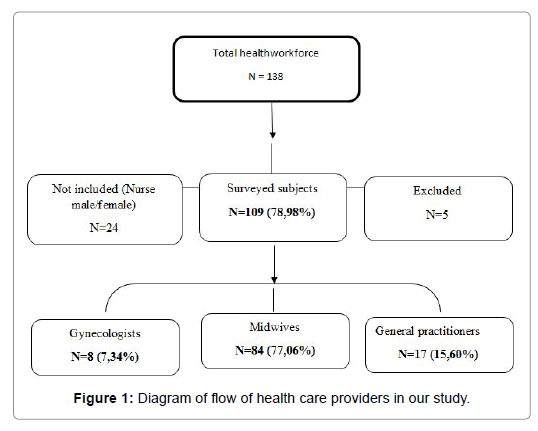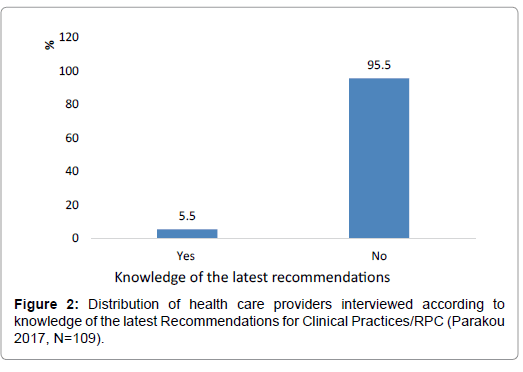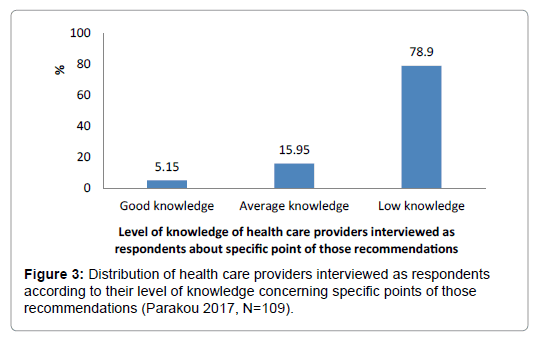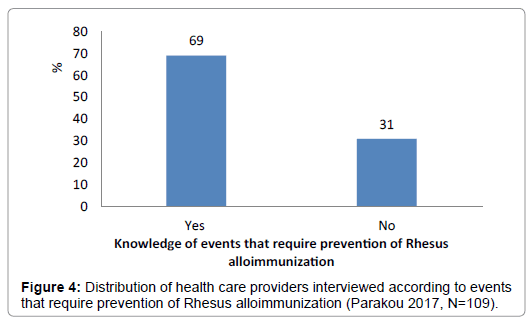Knowledge, Attitudes and Practices of Systematic Prophylaxis of Rhesus Alloimmunization in the Third Quarter of Pregnancy by Health Care Providers of Hospitals and Health Centers of Parakou (Benin) in 2017
Received: 26-Oct-2018 / Accepted Date: 17-Jan-2019 / Published Date: 24-Jan-2019 DOI: 10.4172/2376-127X.1000402
Abstract
Objective: This scientific research work aims to assess the knowledge, attitudes and practices of systematic prophylaxis of rhesus alloimmunization during the third quarter of pregnancy in the city of Parakou during 2017.
Materials and methods: It was a descriptive, cross-sectional and analytical study carried out from March 15 to June 15, 2017, among gynecologists, midwives and general practitioners, through implementation of pregnancy monitoring in Parakou.
Results: The health care providers’ mean age was 38 ± 6.3 years. For 5.5% of cases, the health care providers interviewed had knowledge of the latest recommendations for clinical practices as far as prophylaxis of alloimmunization rhesus is concerned. 95.4% of health care providers did not approve the systematicity of prophylaxis because they considered that they did not have sufficient information’s to justify that practice. None of them prescribed systematically injection of 300 μg of anti-D immunoglobulin (Ig) between 27 and 29 weeks of amenorrhea to rhesus negative patients. And only 1.8% of them had indicated that prevention of rhesus alloimmunization is regulated by a referenced protocol in their health centers. Occupational category appeared to be a critical factor associated with health care providers’ knowledge and their approval of the systematic character of that injection during the third quarter of pregnancy (p<0.001).
Conclusion: Health care providers have an insufficient or little knowledge of the latest Recommendations for clinical practices. They should benefit from Continuing Medical Education (CME) i.e. regular training courses in order to enhance their knowledge and professional skills. In addition, a national reference system should be put in place for systematic prophylaxis of Rhesus alloimmunization during the third quarter of pregnancy.
Keywords: Rhesus alloimmunization; Health care providers; Knowledge; Attitudes; Practices
Introduction
Rhesus alloimmunization is defined as the synthesis of anti-D Ig antibodies, in Rhesus D-negative woman, in response to transplacental passage of RhD-positive fetal erythrocytes (red blood cells) in the maternal circulation [1]. Its frequency has dropped considerably since the generalization of injections of anti-D immunoglobulins among RhD-negative women during pregnancy and after childbirth, since the 70s [2]. Prevalence of residual RhD incompatibilities is estimated at 0.9 for one thousand per year in France. It is estimated that presently nearly 1/4 of those Rhesus alloimmunizations occur during the decline of fetal and maternal hemorrhage without identifiable risk factor, especially in the third quarter. Therefore, they are likely to escape targeted prevention. For instance, a spontaneous passage of red blood cells into maternal circulation occurs in 4% of cases in first quarter, 12% in second quarter and 45% in third quarter. These latter findings have led many countries to propose a supplemental systematic injection of anti-D Ig during the third quarter of pregnancy, i.e. upon 28 weeks of amenorrhea more or less one Week of Amenorrhea (WOA) in accordance with the latest Recommendations for clinical practices [3-5].
Systematic prenatal prophylactic treatment thus reduces sensitivity rate during pregnancy to 0.2% [6-8]. In Benin, policy of systematic prevention in the third quarter is not broadly discussed and it receives little attention, mainly in our area of study located in Parakou. Therefore, the purpose of this research work is to assess the knowledge, attitudes and practices of systematic prophylaxis of Rhesus alloimmunization during the third quarter of pregnancy, implemented by the health care providers working in the hospitals and health centers of Parakou during 2017.
Materials and Methods
This research work was a descriptive, cross-sectional and analytical study with prospective gathering of data performed in the referral public and private maternities of the district of Parakou (Borgou region/Republic of Benin). It was conducted during a time period of three months running from March 15 to June 15, 2017.
The recommendations for clinical practice of the National College of French Gynecologists and Obstetricians (CNGOF) published in 2005 served as inputs for the assessment of knowledge, attitudes and practices concerning systematic prophylaxis of Rhesus alloimmunization in the third quarter of pregnancy.
The population of study included all the health care providers working in the hospitals and the health centers of Parakou. These health care providers supervise the pregnancy and have at least one year of professional experience. It was about the gynecologists and the obstetricians of the midwives, as of the general physicians who carried out a monitoring of the pregnancy and who had agreed to take part under investigation was not included in the study, the nurses.
As regards sampling, we carried out and exhaustive census of all the health care providers answering the criteria of inclusion, what enabled us to obtain a size of 109 health care providers. Five midwives refused to participate to the study. The Figure 1 represents the diagram of flow of the population of study.
The study variables were sociodemographic and professional variables, variables related to knowledge, variables related to attitude and variables concerning practice of systematic prophylaxis of rhesus alloimmunization during the third quarter of pregnancy.
The score of Essi et al. enabled us to harmonize the assessment of participants’ knowledge about the recommendations for clinical practices published by CNGOF in December 2005 concerning systematic prophylaxis of Rhesus alloimmunization in the third quarter of pregnancy [7]. Participants’ scores are classified in terms of poor, weak, average and good, as follows:
• less than 50% of good answers=Poor
• less than 65% of good answers=Weak or Low
• less than 85% of good answers=Average
• more than 85% of good answers=Good
Data gathering was possible through an individual interview using a survey that was preconceived and tested in advance without necessity correction. EPI DATA 3.1 software served for the entry of data at the end of collection. As regards EPI INFO 7.1 software, it was used for analysis and processing of data. In order to cross the two qualitative variables or to compare two percentages, chi-square and p-value had been used. The significance level considered for all statistical analyses was 5%.
Results
Distribution and features of the study population
A total of 109 health care providers were approached during this survey, including 7.34% of gynecologists, 77.06% of midwives and 15.60% of general practitioners (Figure 1).
Mean age was 38 ± 6.3 years and age group oscillating between 30 and 39 years was predominant, with a ratio of 65.1%. Predominance was female and sex ratio estimated at 3.4.
Knowledge of the latest recommendations for clinical practices
5.5% of the health care providers interviewed as respondents had knowledge of the latest recommendations for clinical practices concerning prophylaxis of Rhesus alloimmunization, published by CNGOF. Most health care providers interviewed i.e. a rate of 78.9% had a low level of knowledge about very specific points of those recommendations. Sixty-nine percent (69%) of the health care providers interviewed had knowledge about events that require prevention of Rhesus alloimmunization (Figures 2-4).
Health service providers’ attitudes regarding the implementation of those recommendations
As regards attitude of health care providers interviewed as respondents, 95.4% disapproved the systematic character of prophylaxis because they consider that they do not have sufficient information to justify that practice (Table 1).
| Size | Ratio in % | |
|---|---|---|
| Approve the systematic character of that injection | ||
| Yes | 5 | 4.6 |
| No | 104 | 95.4 |
| Reasons for disapproval of systematicity of injection | ||
| Because it is a product derived from human blood. | 1 | 1.0 |
| Because this practice entails a high financial cost | 35 | 33.65 |
| Because priority should be given to screening techniques like genotyping of fetal rhesus D from maternal blood. | 1 | 1.0 |
| Because you consider that you do not have sufficient information to justify that practice. | 104 | 100.0 |
| Because you consider that at present we stand back too much from the consequences of that systematic injection. | 4 | 3.8 |
Table 1: Distribution of health care providers interviewed as respondents according to their attitudes concerning systematicity of that injection in the third quarter of pregnancy (Parakou 2017, N=109).
Implementation of the latest recommendations for clinical practices concerning systematic prophylaxis of Rhesus alloimmunization in the third quarter of pregnancy
Any of the health care providers interviewed as respondents did not systematically prescribe injection during the third quarter of pregnancy in accordance with the recommendations for clinical practices. 99.1% of health care providers interviewed provided systematically information’s to patient on what Rhesus diseases and only 1.8% answered had that prevention of Rhesus alloimmunization is regulated by a referenced protocol in their health facilities (Table 2).
| Size | Ratio in % | |
| Systematic prescription of injection of 300 µg of Rhophylac IM between 27 and 29 Weeks of Amenorrhea to rhesus negative patients | ||
| Yes | 0 | 0 |
| No | 109 | 100 |
| Systematic provision of information to patient about what rhesus disease is | ||
| Yes | 108 | 99.1 |
| No | 1 | 0.9 |
| Rh alloimmunization is regulated by a referenced protocol | ||
| Yes | 2 | 1.8 |
| No | 107 | 98.2 |
Table 2: Distribution of health care providers interviewed as respondents, according to the implementation of the latest recommendations (Parakou, 2017, N=109).
Factors associated with knowledge, attitudes and practices (KAP)
It seemed that occupational category and knowledge of the latest recommendations are the main factors associated with KAP of the latest recommendations for clinical practices concerning systematic prophylaxis of Rhesus alloimmunization during the third quarter of pregnancy, as published by CNGOF in December 2005 (p<0.001) (Table 3).
| Variables | Total (N) | Knowledge of the latest recommendations | OR | [CI95% OR] | p | |
|---|---|---|---|---|---|---|
| N | % | |||||
| RhAI is regulated by are ferenced protocol | 0.04 | |||||
| Yes | 2 | 1 | 50 | 20.4 | 1.11-375.82 | |
| No | 107 | 5 | 4.67 | 1 | - | |
| Occupational category | 0.0001 | |||||
| Gynecologist and obstetrician | 8 | 4 | 50 | 1 | - | |
| Midwife | 84 | 1 | 1.19 | 0.01 | 0.001-0.134 | |
| General practitioner | 17 | 1 | 5.88 | 0.06 | 0.005-0.724 | |
| Approval of systematicity of that injection | 0.0001 | |||||
| Yes | 5 | 4 | 80 | 203.99 | 15.16-2745.17 | |
| No | 104 | 2 | 1.92 | 1 | - | |
Table 3: Multivariate Analysis of factors associated with health care providers’ knowledge of the latest Recommendations for Clinical Practice (RCP) concerning systematic prophylaxis of Rh alloimmunization (RhAI) in the third quarter of pregnancy
Discussion
We have highlighted that among the study population only 5.5% were aware of the content of the latest recommendations related to Rhesus alloimmunization. These results are well below those found by Bissek MN in Cameroon in June 2013, by Lacambra A in Île-de- France (Paris region) in 2014 as well as by Dureau A in Nancy (France) in 2009, who had respectively reported 33%, 59% and 85% as high level of knowledge [8-10]. This large gap of level of knowledge about recommendations for clinical practices between our findings and the results of the other researchers may be due to the lack of referenced protocols in the medical units/wards. Moreover, it may also be explained by the lack of Continuing Medical Education (CME) among health care providers. Continuing medical education should be an individual obligation as part of a permanent approach. But unfortunately, the lack of continuing medical education based on efficient organization and monitoring is a weakness at all levels of the national health system.
In this research work, 68.81% of the health care providers interviewed as respondents were aware of the events that require prevention of Rhesus alloimmunization. This ratio is fairly good for it is similar to those obtained in Cameroon by Bissek MN i.e. 72% which is the rate of knowledge of high-risk event [8]. This result is identical to the one that Dureau A [10] got in his study conducted in Nancy (France) where knowledge rate was 55.80%. However, in our study, 95.4% of health care providers interviewed did not approve the systematic character of prophylaxis because they considered that they do not have sufficient information’s to justify that practice. This point of view is common in the studies of other authors but not based on the same grounds. For instance, in February 2012 in Nancy (France), Vallotton T, reported a rate of 80% of respondents who claimed that they disapproved systematic character. The reasons put forward were the danger that injection poses to their patient due to the use of a blood derivative and ethical aspect of injection is another reason [11]. In the study of Lacambra A, 24% disapproved the systematicity of that injection because they thought that priority should be given to screening method such as fetal rhesus D genotyping from maternal blood [9]. Eventually, in the research work carried out by Marie-Noelle BISSEK, 12.7% did not approve that systematic character because that practice generates a high financial cost.
The recommendations for clinical practices have been designed after the analysis of several studies and trials conducted in developed countries [12]. Their disclosure would explain why there are much more adherence to the said recommendations in those countries. As regards the practice of the health care providers interviewed, 99.1% of them provided information about what Rhesus disease is even though the said information was not complete. In his study conducted in France, Dureau A had found out that 88.5% of health care providers complied with the recommendations for clinical practices concerning information. By contrast, in our research work, no one of the health care provider (0%) prescribed systematically that injection to rhesus negative patients during the third quarter of pregnancy. As regards the 5.5% with good knowledge of the recommendations for clinical practices, this lack of practice may be due, on the one hand, to the fact they had never implemented it since that practice was not yet adopted in their health facility. On the other hand, as regards health care providers with low and average level of knowledge, the lack of practice may also be due to the fact that they disapproved the systematicity of that practice, especially because of lack of information’s. In a study conducted in Cameroon, Bissek MN, has reported that 63% of health care providers had an inadequate practice of systematic prevention versus 37% who had an adequate practice [8]. As a result of this remark, we can say that although the systematic prevention topic still represents a real challenge in Africa, some countries implement it [13]. However, in the study of Dureau A, 57.4% of health care providers systematically prescribed anti-D Ig injection [10]. Besides, Vallotton T, has reported in his study that 80% of health care providers had performed systematic injection.
The prevention of Rhesus alloimmunization is not always approved by all the medical practitioners, as a result there are differences in practices and therefore in provision of care to patients [14]. Nevertheless, this should not be an excuse for lack of knowledge of that practice in our area of study. It seems important that achievements and advances in the prevention of Rhesus alloimmunization be known by all. This will ensure an adequate implementation of prophylaxis. In this context, it is necessary that at national level referentials be periodically reviewed and complemented with updated research data. Moreover, those referentials should be available in all the health facilities in order to standardize medical practices.
As regards factors associated with knowledge, attitudes and practices, after multivariate analysis, occupational category and approval of injection systematicity emerged as the main factors associated with knowledge by interviewed health care providers of the latest Recommendations for clinical practices. The fact that gynecologists had a high knowledge of the Recommendations for clinical practices could be explained by their teaching and academic status. This status of lecturer thereby gives them the opportunity to regularly update their knowledge and technical skills in their sphere of activity.
Conclusion
The health care providers have a low knowledge of the latest recommendations for clinical practices and also hold a disapproving stance towards it due to lack of information’s. As a result, they do not practice it. Under these circumstances, it is necessary to organize continuing medical education in order to enhance health care providers’ knowledge. In addition, it is important to put in place a national referential for systematic prophylaxis of Rhesus alloimmunization during the third quarter of pregnancy in order to ensure adequate care provision for RhD-negative pregnant woman.
Ethical Aspects
Authorization of the responsible hospitals and maternity hospitals was obtained before the start of the study. The oral consent, anonymity of the health care providers and the confidentiality of the data were respected.
References
- Denis V (2008) Prevention of fetal and maternal Rhesus D alloimmunization. Vacation Midwife 66: 20-24.
- Parent O (2006) Prevention of alloimmunization Rhesus D fetal-maternal recommendations. J Obstet Gynecol Reprod Biol 35: 93-103.
- Cortey A, Brossard Y (2006) Recommendations for clinical practice-Prevention of fetal and maternal Rhesus D alloimmunization, Practical aspects. J Obstet Gynecol Reprod Biol 35: 123-130.
- Rigala D, Meyera F, Mayranda E, Dupraza F (2008) Fetish-maternal anti-erythrocyte alloimmunizations: State of the art in 2008. Francophone J Laboratories 402: 51-62.
- Mc Bain RD, Crowther CA, Middleton P (2015) Anti-D administration in pregnancy for preventing Rhesus allo-immunisation. Cochrane Database Syst Rev 3: CD000020.
- Farnaud L, Garcia-Meric P, Cortey A, Arnaud F (2011) Fetomaternal anti-RH3, 4 (anti-E and anti-c) rhesus isoimmunization: A case report. Arch Pediatr 18: 176-182.
- Jose EM, Oudou N (2013) KAP (Knowledge, Attitudes, Practices) survey in Medical research. Health Sci Dis 14: 1-3.
- Bissek MN (2013) Evaluation of the knowledge, attitudes and practices of health care staff in the field of Rhesus D iso-immunization. J Med Health Sci Pp: 127.
- Lacambra A (2014) Antenatal prevention of alloimmunization foeto-maternal anti-RH1: State of the art knowledge and professional practices within different perinatal networks in Ile-de-France. University of Ile-de-France, France. Pp: 1-71.
- Dureau A (2009) The systematic prophylaxis of Rhesus alloimmunization by injection of immunoglobulins in the third quarter of pregnancy: Audit of target clinic for practices of health professionals from the Lorraine region perinatal network. University of Nancy, France. Pp: 1-103.
- Vallotton T (2011) Prevention, monitoring and provision of care for alloimmunized pregnant woman in Lorraine. University of Lorraine, France. Pp: 130.
- Benkerroum Z, Lachiri B, Lazrak I, Moussaoui R, Dehayni M (2015) Fetal and maternal alloimmunization Rhesus serious about a case and review of the literature. The Pan Afri Med J 22: 137.
- Linet T (2008) Prevention with Rhophylac® and pregnancy, a different interpretation. Vocation Midwife 66: 25-29.
- World Health Organization (2016) Guidelines on management of blood and blood components as essential medicines. Geneva.
Citation: Sidi Imorou R, Salifou K, Vodouhe M, Ogoudjobi OM, Tognifode V, et al. (2019) Knowledge, Attitudes and Practices of Systematic Prophylaxis of Rhesus Alloimmunization in the Third Quarter of Pregnancy by Health Care Providers of Hospitals and Health Centers of Parakou (Benin) in 2017. J Preg Child Health 6:402. DOI: 10.4172/2376-127X.1000402
Copyright: © 2019 Sidi Imorou R, et al. This is an open-access article distributed under the terms of the Creative Commons Attribution License, which permits unrestricted use, distribution, and reproduction in any medium, provided the original author and source are credited.
Select your language of interest to view the total content in your interested language
Share This Article
Recommended Journals
Open Access Journals
Article Tools
Article Usage
- Total views: 5619
- [From(publication date): 0-2019 - Nov 24, 2025]
- Breakdown by view type
- HTML page views: 4487
- PDF downloads: 1132




